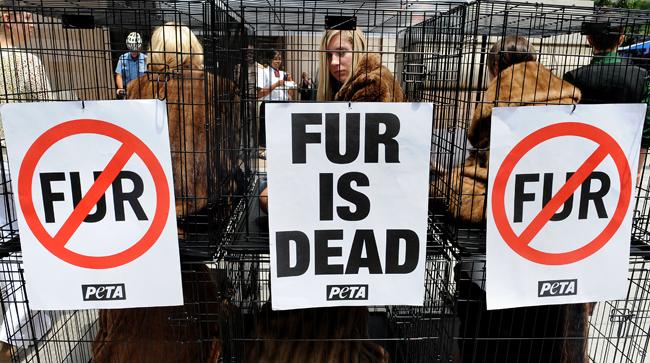People for the Ethical Treatment of Animals—otherwise known as PETA—has some furry issues. Some would argue that the organization has done more harm than good in “standing up” for animals. In addition, its method’s can be extremely overboard, humiliating, and offensive. Is this how animal rights groups should really catch the world’s attention?
The organization’s website stipulates that, “PETA focuses its attention on the four areas in which the largest numbers of animals suffer the most intensely for the longest periods of time: on factory farms, in the clothing trade, in laboratories, and in the entertainment industry. We also work on a variety of other issues, including the cruel killing of beavers, birds, and other ‘pests’ as well as cruelty to domesticated animals.”
PETA’s annual budget is 533 million. Despite this large amount, only 1% of this money is spent on helping animals. Their animal shelters inVirginiaandNorth Carolinahardly make a significant difference in the current conditions animal abuse. Most of this money goes to ad campaigns, paying celebrities to go nude and protest against animal cruelty. In addition, money is also spent on very expensive Superbowl ads.
How does going nude carrying a sign saying “I’d rather be naked” help animals? These publicity stunts culminated in an incident in 2000, where members posed nude in front of the White House, comparing the victims of the holocaust to mistreated animals. Their statements included, “To animals, all people are Nazis” and “Don’t let your dog or cat become an ‘octomom’—always spay or neuter”.
The only way to reach people’s hearts to help animals is by showing compassion and love rather than mocking, or using offensive ad campaigns to get results. Such aggressive ads benefit neither humans nor animals; rather, they perpetuate the idea that PETA is not serious in ending animal abuse. The Sydney Morning Herald once read, “Pro-vegetarian group treats women like meat.”
Although PETA says that it relies solely on advertising through media coverage, receiving a positive representation, “…Can be especially difficult with our fur campaign, since newspapers are often reluctant to cover our activities for fear of losing furriers’ advertising dollars.” So, they resort to media stunts that do the job without positive “coverage”.
PETA recently is going as far as creating a porn site. PETA’s associate director of campaigns says, “We try to use every outlet that we can to speak up for animals. We anticipated that this new triple-X domain name would be a hot topic and we immediately decided to use it and take advantage of it to try to promote the animal rights message.”
At this point, PETA should be put to a stop. Why use something as shameful as porn to draw people’s attention? An article from The Slate says, “PETA’s history of using controversial tactics to garner media attention may get people talking, but there’s a long way to go between searching the Internet for porn and volunteering at a local animal shelter. The only ‘action’ that the site is likely to prompt is the quick closing of a browser window.”
Cruelty to animals includes euthanizing an animal who is not suffering. However, PETA completely violates this fact. PETA killed 21,537 animals from 2000 to 2009. In 2006, 97.4% of the animals that PETA took in were euthanized. Twelve were adopted. In 2009, only eight animals were adopted. In 2010, 93.8% were killed. People would rather pose naked in ad campaigns than truly live up to their principles.
It is upsetting to find that there are still two million people who support PETA. Perhaps they are not aware of PETA’s disturbing underlying secrets. The more awareness, the better. Hopefully, the public will learn the true facts about PETA, and force the organization to put their money and resources where their mouth is.
